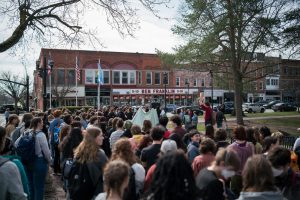Love and Loss in Three Tongues: LeFebvre’s Performance Wows Crowd in Warner
February 7, 2014
English, German, Italian, gibberish: Associate Professor of Singing Timothy LeFebvre can do them all. In a diverse Jan. 31 recital in Warner Concert Hall, with Professor of Instrumental Accompanying James Howsmon on piano, LeFebvre demonstrated his facility with all these languages, as well as his impressive voice and sensitivity to text.
LeFebvre’s song is like a father’s strong, comforting hand tucking a child into bed. His voice has a substantial weight behind it and the capacity for great power, but the strength is comforting rather than intimidating. The first half of the program demonstrated that quiet potency especially well. Handel’s arias “Where’er You Walk,” from the opera Semele and “Frondi tenere… Ombra mai fù” from the opera Serse were simple expressions of adulation that immersed the audience in the deep pool of LeFebvre’s voice. A storm then clouded the scene in “Del minacciar del vento,” from Handel’s opera Ottone, in which LeFebvre unleashed his massive tone and technique in defiant runs, compounded by Howsmon’s unflinching piano work.
An die ferne Geliebte, Beethoven’s only song cycle, restored the placidity of the earlier Handel arias. The lyrics convey a lover’s sighs of lament at the distance between himself and his beloved. The songs are saturated by natural imagery; the speaker entreats the clouds to greet his lady and rejoices in the renewing power of spring. One might expect a melancholy, melodramatic setting for such poetry, but the music is carefree and pastoral instead, and LeFebvre tenderly crooned the songs, at times playfully romping through the green fields and flowing rivers conjured by Howsmon’s bright touch. Though shadows occasionally darken the mood as the poet despairs of his separation from his lover, they pass as quickly as they appeared. The cycle ends with what proved to be the highlight of the night, a serene declaration that “these songs reclaim all that was separated by lonely hours, and a loving heart attains what a loving heart has earned.”
After the intermission, LeFebvre progressed to the more dramatic repertoire. He released the brunt of his voice on a set of five songs by Ottorino Respighi, characterized by operatic scales and luscious harmonies. Anguished cries of loneliness like “Ballata” and “Nebbie” darkened the program, the latter rendered especially powerful by LeFebvre’s booming voice, while the simple “Stornellatrice” harkened back to the light Italian art song of an earlier era, for which LeFebvre appropriately adopted a more delicate, lyric tone. Howsmon’s rich chords shone in the caressing “Notte,” and LeFebvre’s rendition of “Invito alla danza” charmed the audience.
The program ended with some good old Americana as LeFebvre sang selections from Copland’s Old American Songs. Despite the flashy touches added by Copland, these arrangements of folk tunes maintained their rustic appeal. LeFebvre’s barrel-chested bellows in “The Boatmen’s Dance” complemented rollicking piano tunes that wouldn’t sound out of place in Kern and Hammerstein’s Show Boat. “At the River” was majestic, while the exquisite “Simple Gifts,” popularized by Copland’s ballet Appalachian Spring, evoked images of a quaint country church. Finally, that aforementioned gibberish showed up in the galloping rendition of “Ching-a-ring Chaw.”
LeFebvre and Howsmon returned for one encore, Erich Korngold’s “Tanzlied des Pierrot” from his opera Die Tote Stadt. LeFebvre showed off his impressive upper range with melodies steeped in unabashed romance — a welcome last opportunity to bask in the warm embrace of LeFebvre’s voice.

























